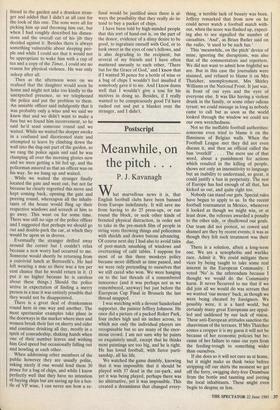Postscript
Meanwhile, on the pitch . . .
P. J. Kavanagh
What marvellous news it is, that English football clubs have been banned
from Europe indefinitely. It will save me from having to do 25 press-ups, or run round the block, or seek other kinds of frenzied physical distraction, in order not to take in the pre-match film of people in string vests throwing things and policemen with shields and drawn batons advancing. Of course next day I had also to avoid tales of post-match smashing of windows and overturning of café tables. I suppose for most of us this three monkeys policy became more difficult as time passed, and we were only pretending to ourselves that we still cared who won. We Were hanging on to the last threads of a remembered innocence (and it was perhaps not as we remembered, anyway) but just before the European Cup Final in Brussels the last thread snapped.
I was watching with a devout Sunderland supporter, the painter Jeffrey Johnson. He once did a picture of a packed Roker Park, four inches high and six inches across, in which not only the individual players are recognisable but so are many of the enor- mous crowd. I am not sure why he paints so exquisitely small, except that he thinks most paintings are too big, and he is right. He has loved football, with fierce parti- sanship, all his life.
We watched the game dumbly, knowing that it was impossible that it should be played with 37 dead in the car-park, and yet it was being played, perhaps there was no alternative, yet it was impossible. This created a dreaminess that changed every-
thing, a terrible lack of beauty was born. Jeffrey remarked that from now on he could never watch a football match with- out, when the score was flashed up, expect- ing also to see signalled the number of casualties. 'And', as Brian Butler said on the radio, 'it used to be such fun.'
This 'meanwhile, on the pitch' device of mine, ignoring the disruptions, was also that of the commentators and reporters. We did not want to admit how frightful we are. But in this case the journalists were stunned, and refused to blame it on Mrs Thatcher, unemployment, Mrs Shirley Williams or the National Front. It just was, in front of our eyes and the eyes of everyone else. It was like having a violent drunk in the family, or some other odious tyrant; we could manage as long as nobody came to call but as soon as the world looked through the window we could see our own wretchedness.
Not so the ineffable football authorities: someone even tried to blame it on the flimsiness of Belgian walls. When the Football League met they did not even discuss it, and then an official called the ban 'overkill' . . . . The mere use of that word, about a punishment for actions which resulted in the killing of people, shows not only an insensitivity to language but an inability to understand, so great, it could justify a ban in perpetuity. The rest of Europe has had enough of all that, has kicked us out, and quite right too.
Nobody can stand our guts. Special rules have begun to apply to us. In the recent football tournament in Mexico, whenever it looked as though we might win, or at least draw, the referees awarded a penalty to the other side, or disallowed our goals. Our team did not protest, so cowed and shamed are they by recent events; it was as though they felt such treatment was their due.
There is a solution, albeit a long-term one. We are a xenophobic and warlike race. Admit it. We could mitigate these vices by being taught to take some real interest in the European Community. I voted 'No' iu the referendum because I thought we would do the Community harm. It never occurred to me that if we did join all we would do was scream that we wanted 'our money' back, as though we were being cheated by foreigners. We possibly were, it is a hard world, but certainly many great Europeans are appal- led and saddened by our lack of vision.
These anti-European attitudes sanction the chauvinism of the terraces. If Mrs Thatcher comes a cropper it is my guess it will not be because of her economic policies but be- cause of her failure to raise our eyes from the feeding-trough to something wider than ourselves.
If she does so it will not cure us at home, but it might make us think twice before stripping off our shirts the moment we get off the ferry, swigging duty-free Drambuie from the bottle and taunting and jeering the local inhabitants. These might even begin to despise us less.














































 Previous page
Previous page